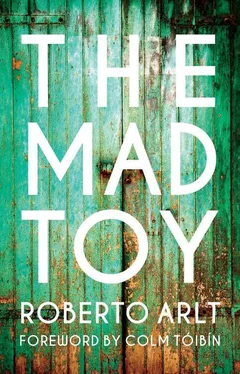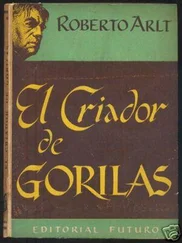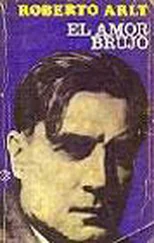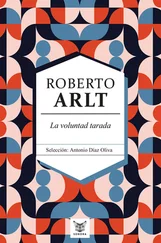Maximito, the cause of these ridiculous quarrels, was a twenty-eight-year-old rogue, who was ashamed of being Jewish and of being a painter.
In order to hide his shameful condition, that of being a working man, he dressed himself up as a gentleman, wore spectacles and each night before going to bed rubbed glycerine into his hands.
I knew some juicy stories about his mischievous tricks.
Once he secretly collected some money a bar-owner owed his father. He was twenty years old and thought that he had a flair for music, so he spent the total on a magnificent gilded harp. Maximito explained, on his mother’s urging, that he had won some pesos as a part share in a lottery ticket, and Señor Naidath said nothing, but looked suspiciously at the harp, and the guilty couple trembled like Adam and Eve in Paradise under the gaze of Jehovah.
The days went by. Maximito played the harp and the old Jewess rejoiced. These things happen. Señora Rebeca told her friends that Maximito was a very promising harpist, and people, when they saw the harp in the corner of the dining room, agreed.
However, despite his generosity, Josias was at times a prudent man, and soon realised the scam by which magnanimous Maximito had become the owner of the harp.
And so, Señor Naidath, who was extremely strong, got on top of the situation and, as the Psalmist recommends, spoke little and did much.
It was Saturday, but Señor Josias didn’t give a damn for the precepts of Moses; by way of a prologue he gave his wife two kicks up the backside, then he grabbed Maximito by the shirt-collar and, after giving him a dusting-off, took him out into the street; as for the neighbours who had come out of doors in shirtsleeves and who were having a wonderful time with the ruckus, Señor Naidath threw the harp at their heads from an upstairs window.
This made life much happier for all concerned, and that’s why people said of the Jew that ‘Señor Naidath… he’s a good man.’
I finished sprucing myself up, and went out.
‘Well, goodbye, Frau, say hello to your husband and to Maximito from me.’
‘Aren’t you going to say thank you?’ my mother interrupted.
‘I already said it.’
The Hebrew woman raised her envious little eyes from the slices of buttered bread and weakly held out her hands. I could see that she was already wishing me failure in my venture.
I got to Palomar as it was getting dark.
When I asked the way, an old man who was sitting smoking on a bundle under the green light of the station, indicated to me, with an admirable economy of gesture, a way through the shadows.
I realised that I was dealing with a completely indifferent man; I didn’t want to abuse his reticence, so, knowing almost as much as before I’d asked his help, I said thank you and set off.
The old man called after me:
‘Hey, kid, you got ten centavos?’
I thought about not giving him anything, but I thought that if God existed then he could help me in my task if I helped the old man, and so, not without a certain hidden pain, I went over to give him a coin.
The raggedy man then became more explicit. He got up from his bundle and signalled a point in the darkness with a trembling arm:
‘Look, kid… Carry on, straight on and then the officers’ club is on the left.’
And so I walked.
The wind moved the dry leaves of the eucalyptus, and, striking the tree trunks and the high telegraph wires, whistled howlingly.
Crossing the muddy road, feeling my way along a wire fence, and moving as quickly as the terrain allowed, I reached the building which the old man had pointed out as the Club.
Uncertain, I stopped. Should I call? There was no soldier on guard duty in front of the door, behind the railings.
I went up three steps and then bravely, or so I thought, entered a narrow wooden corridor — the whole building was made out of wood — and stopped in front of the doorway of an oblong room with a table in the middle.
Around the table, three officers, one of them lying on a sofa by the sideboard, another with his elbows on the table, and a third with his feet up in the air, leaning his seatback against a wall, were making desultory conversation in front of five bottles of different colours.
‘What do you want?’
‘I’m here because of the advertisement, sir.’
‘The vacancies have been filled.’
I shot back, absolutely tranquil, filled with the serenity that comes after a piece of bad luck:
‘Goodness, that’s a shame, because I’m an inventor myself, I’d have been right at home here.’
‘And what have you invented? Come in, sit down,’ a captain said, sitting up on the sofa.
I replied calmly:
‘An automatic meteor signalling device, and a machine that prints what you dictate to it. I have a letter of congratulation here from Ricaldoni the physicist.’
This aroused the curiosity of the three bored officers, and I realised I had got their attention.
‘All right, sit down,’ one of the lieutenants said, looking me over from head to toe. ‘Explain your famous inventions to us. What were they, again?’
‘An automatic meteor signalling device, sir.’
I leant against the table, supporting myself with my arms, and looked with what I thought was an investigative gaze at the faces with their hard lines and inquisitive eyes, three weather-beaten faces belonging to men used to dominate other men, faces that looked at me with half-curious, half-ironic expressions. And in that moment, just before I began to speak, I thought about the heroes of my favourite books, especially Rocambole: Rocambole with his rubber-visored cap and the rogue’s smile on his twisted lips passed in front of my eyes, pushing me onwards to be confident and strike a heroic pose.
Comforted, sure that I would make no mistakes, I said:
‘Sirs: you know that selenium is a conductor when it is exposed to light, and an insulator in the dark. The signalling device is nothing more than a selenium cell connected to an electromagnet. When the meteor passes over the selenium element, it would trigger a signal, the light of the meteor, concentrated via a concave lens, would turn the selenium into a conductor.’
‘Very good. And the writing machine?’
‘The theory is as follows. In a telephone, sound is converted into an electromagnetic wave. If we use a tangent galvanometer to measure the electrical intensity of each vowel and consonant, then we can calculate the number of ampere-turns needed to make an electronic keyboard that would respond to the electrical intensity of each sound.’
The lieutenant’s frown deepened.
‘It’s not a bad idea, but you aren’t taking into account the difficulty of creating electromagnets that would respond to such small electric variations, and that’s even before you start to think about the different types of voice that there are, or else residual magnetism; another problem, even more serious, the worst, perhaps, is how you make each individual current travel to the correct electromagnet. But have you got Ricaldoni’s letter there?’
The lieutenant bent over it; afterwards he handed it to the other officers and spoke to me:
‘Have you seen it? The problems I noticed have been picked up by Ricaldoni as well. But your idea in principle is very interesting. I know Ricaldoni. He was my teacher. He’s a clever man.’
‘Yes, short and fat, pretty fat.’
‘Would you like to pour yourself a vermouth?’ the captain offered with a smile.
‘Thank you, sir. I don’t drink.’
‘Do you know anything about mechanics?’
‘A bit. Kinematics… dynamics… steam engines and combustion engines; crude oil engines as well. I’ve studied chemistry and explosives too, which is an interesting topic.’
Читать дальше












